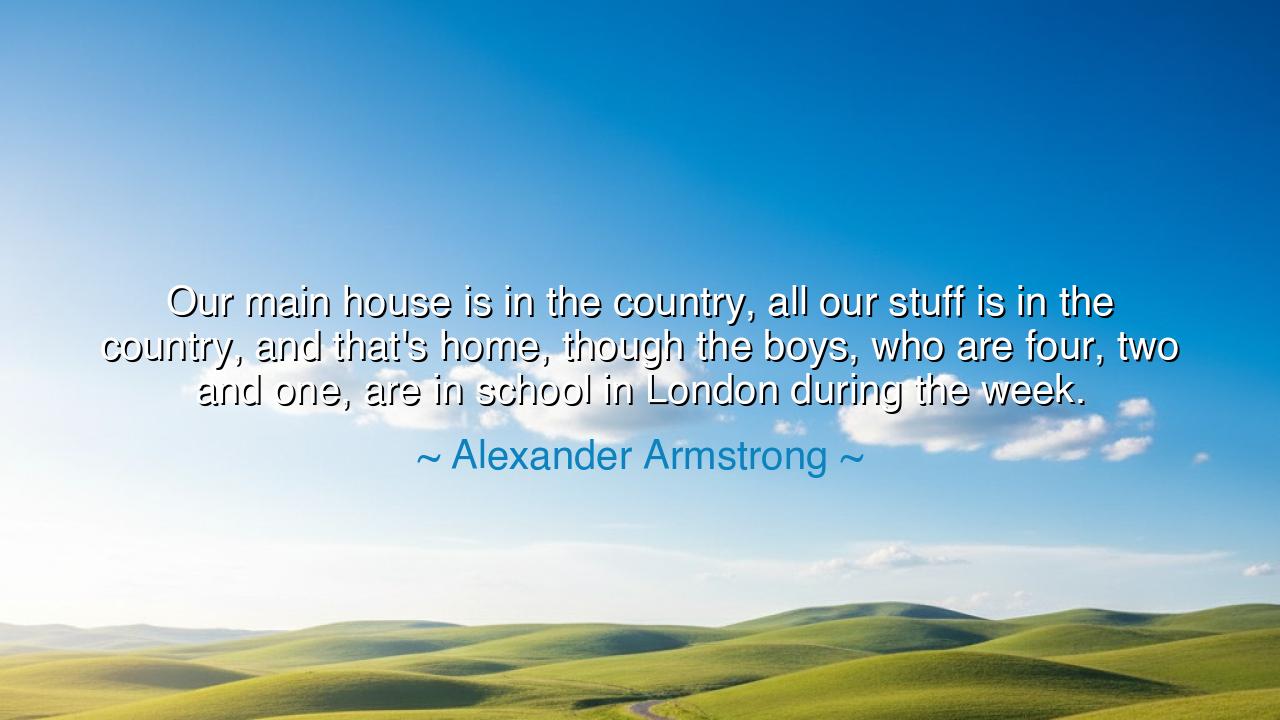
Our main house is in the country, all our stuff is in the
Our main house is in the country, all our stuff is in the country, and that's home, though the boys, who are four, two and one, are in school in London during the week.






In the words of Alexander Armstrong, “Our main house is in the country, all our stuff is in the country, and that’s home, though the boys, who are four, two and one, are in school in London during the week.” — we hear not merely the account of a household, but a meditation on the meaning of home, of place, and of belonging. Beneath these ordinary details lies a truth as ancient as the hearth itself: that home is not defined by where one stands, but by where one’s heart rests. His words remind us that in this age of movement and change, it is possible to live in two worlds at once — the world of duty and the world of peace — and that true contentment lies in keeping both in harmony.
The meaning of this reflection lies in the balance between the rhythms of labor and the sanctity of rest. In London, the family’s children study, and life moves with the pulse of duty — the weekday world of effort, structure, and progress. But in the country, where “all our stuff” resides, there is stillness, memory, and meaning. It is the seat of permanence — the soil of roots, the keeper of identity. Armstrong’s words are not about geography, but about the duality of human life. Every soul, like every family, must find its way between the city and the countryside, between striving and stillness, between doing and being.
The origin of this truth can be found in the story of humankind itself. From the beginning, people have moved between places of work and places of rest. The farmer left his field at dusk and returned to his fire; the merchant left the market and came back to his threshold. The city, bright with promise, has always been the symbol of ambition — the forge where the mind is sharpened and the future shaped. But the countryside, broad and breathing, is the realm of the heart, where the soul remembers what it is to live simply and fully. So too does Armstrong’s reflection speak of this eternal pattern — that even as life pulls us toward the world’s noise, we must return to silence to remain whole.
In the ancient world, there was once a Roman statesman named Cincinnatus, who embodied this same balance. He was called from his plow to lead his people in war, and when the battle was won, he returned again to his fields. Power could not tempt him from his home; glory could not keep him from his earth. His heart belonged to both worlds, but his soul remained grounded in one. In the same way, Armstrong’s country home stands as a modern echo of that timeless refuge — a reminder that while we may live amidst ambition, we must root ourselves in peace if we are to remain true.
There is also tenderness in Armstrong’s words — a father’s awareness of the fleeting nature of time. The children are young, and already life moves quickly between home and school, between laughter and duty. His reflection carries the quiet understanding that home, though physical, is also emotional — built of memories, not walls. The “country house” becomes a metaphor for the heart’s sanctuary, the place where the laughter of his sons will someday linger even when they are grown. Home, then, is not merely where one’s possessions dwell, but where one’s spirit finds rest after the day’s journey.
At its heart, this quote speaks to the longing that all people feel — to belong both to the world of creation and to the world of contentment. We are creatures of striving, yet also of stillness. We seek purpose in our work, but meaning in our rest. Armstrong’s simple statement captures that quiet wisdom: that a family, like a tree, must have both roots and branches — roots deep in the soil of home, branches reaching toward the sky of opportunity. Only when both are nurtured can life remain balanced and whole.
Thus, the lesson of this reflection is clear and enduring: remember your home, whatever shape it takes. Whether it is a place, a person, or a memory, guard it as the hearth of your being. The world will pull you outward — toward duty, ambition, and progress — but never let it steal your inward peace. Make time to return to stillness, to gather your spirit where it first learned to rest. Keep a space in your life where time slows, where love gathers quietly, where laughter and warmth make walls of their own.
And so, my children, take this wisdom to heart: live in the world, but do not let the world live in you. Build your cities, chase your dreams, send your children forth to learn and to grow — but keep your hearth burning in the countryside of the soul. For no matter how far you wander, or how bright the city lights may shine, you will always need that one place, humble or grand, where the heart can return and say, “This is home.”






AAdministratorAdministrator
Welcome, honored guests. Please leave a comment, we will respond soon